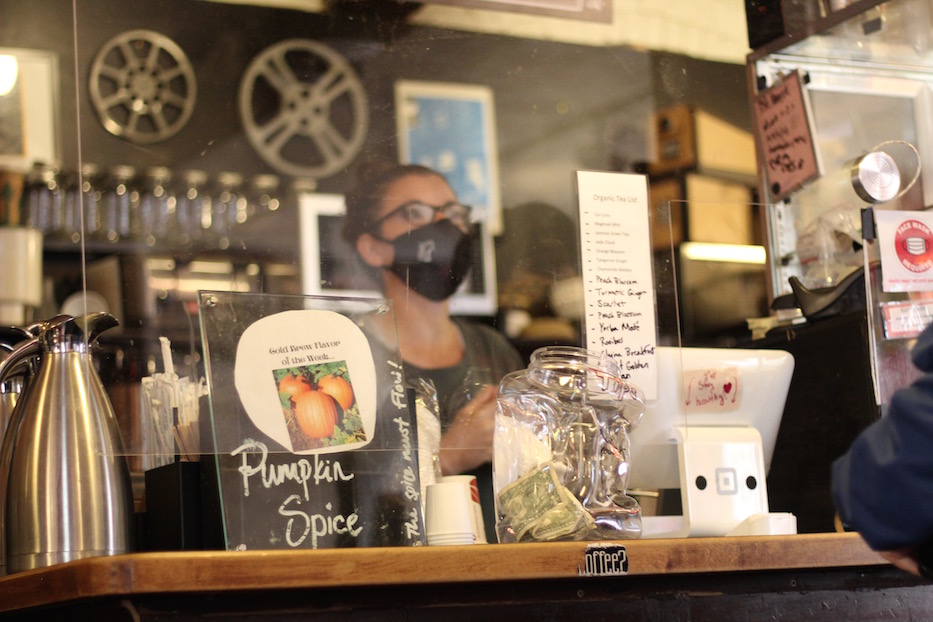
Economic Development | Arts & Culture | Culinary Arts | COVID-19
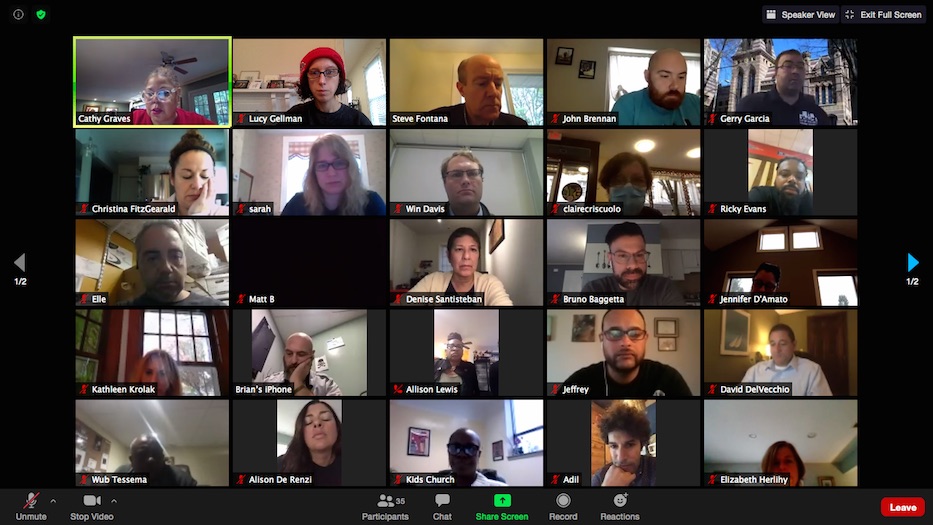
Screenshot from Zoom.
As New Haven reels from a second spike in COVID-19 cases, restaurants and small food businesses are asking the city for more support. In turn, the city has introduced new regulations to help get them through the winter.
That’s the story for food businesses across the city, which are struggling to adapt as the state rolls back to Phase II pandemic guidelines and discussions over federal relief remain at a standstill. From Koffee? to D’Amatos Seafood to Zinc to Ricky D’s Rib Shack, all owners seem to agree on one thing: they want to see a greater presence from city officials if they’re going to survive.
Last week, several made an appeal for support in a roundtable with officials from the city’s Economic Development Administration. Just hours later, Mayor Justin Elicker announced that the city would be returning to Phase II, which allows indoor dining at 50 percent capacity. Phase III had allowed indoor dining at 75 percent capacity.
“One of the things we’re grappling with is the short amount of time [until the winter],” said Steve Fontana, deputy economic development director for the city. “We’re not in the business of reinventing the wheel. We’re trying to do our best. ”
Some of the hardest-hit businesses are the brick-and-mortar establishments in the radius of downtown, which rely heavily on foot traffic from Yale students. In late October, the city announced that it is extending summer outdoor dining permits through March 31, 2021. Those previously ended on Dec. 1.
Under new regulations, businesses are permitted to use tents, tables, and outdoor heaters in the public right-of-way through the end of next March. The city is considering it an extension of summer 2020 outdoor dining, meaning that businesses that already have an outdoor dining permit will not have to reapply until next year.
It has also been working to spread the word about COVID-19 relief grants, including those from the Hartford Economic Development Corporation (HEDCO) and new Connecticut CARES Small Business Grant Program. Cathy Graves, deputy director of small business development, said that the city is trying to be responsive to what restaurateurs need.
“We can all come up with some kind of ideas, but you know what works better than we know what works,” she said during the Zoom roundtable. “That is the strong takeaway.”
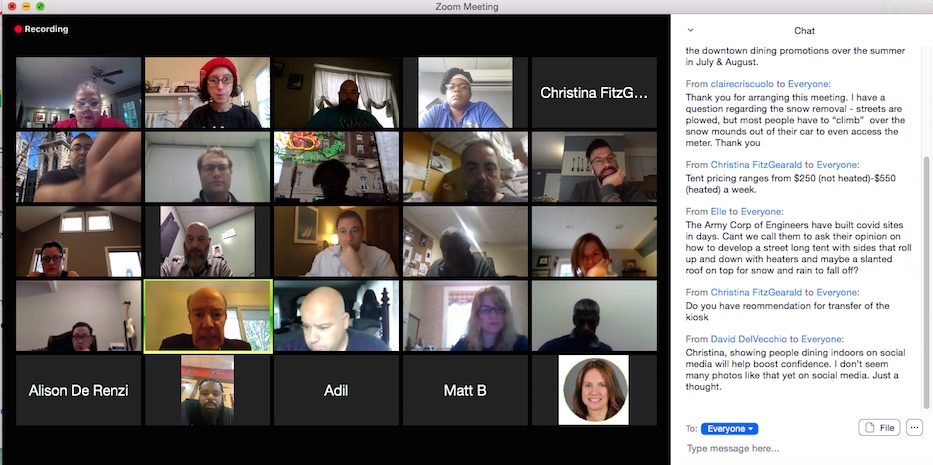
Christina FitzGerald, director of sales and marketing at Union League Cafe, said that may not be enough to keep restaurants like Union League going through the winter months. She asked if the city could do more to “increase confidence” in indoor dining as the cold weather becomes a frequent presence in New Haven.
“I really feel the best thing to get people to New Haven in the wintertime is raising their confidence in what they’re doing,” she said. “If they don’t feel confident, then they’re not going to come.”
Fontana said that the city is sympathetic, and has also been closely monitoring the state’s recent spike in cases. As of Nov. 5, 4,656 people had died from the virus in Connecticut. In total, the state has seen over 77,060 cases. Data from the Centers for Disease Control and Prevention (CDC) has shown that adults who test positive for COVID-19 are twice as likely to have eaten at a restaurant beforehand.
Jennifer D’Amato, who runs D’Amatos Seafood with her husband Toma, said that the key to staying alive for her businesses has been adapting to and promoting a takeout-only model. Early in the pandemic, the Whalley Avenue restaurant signed on to an exclusive partnership with DoorDash that allowed it to cap the percentage DoorDash took out of each order. It tailored its storefront and cooking practices to prioritize both employee and customer safety. It started promotional giveaways and challenges on social media.
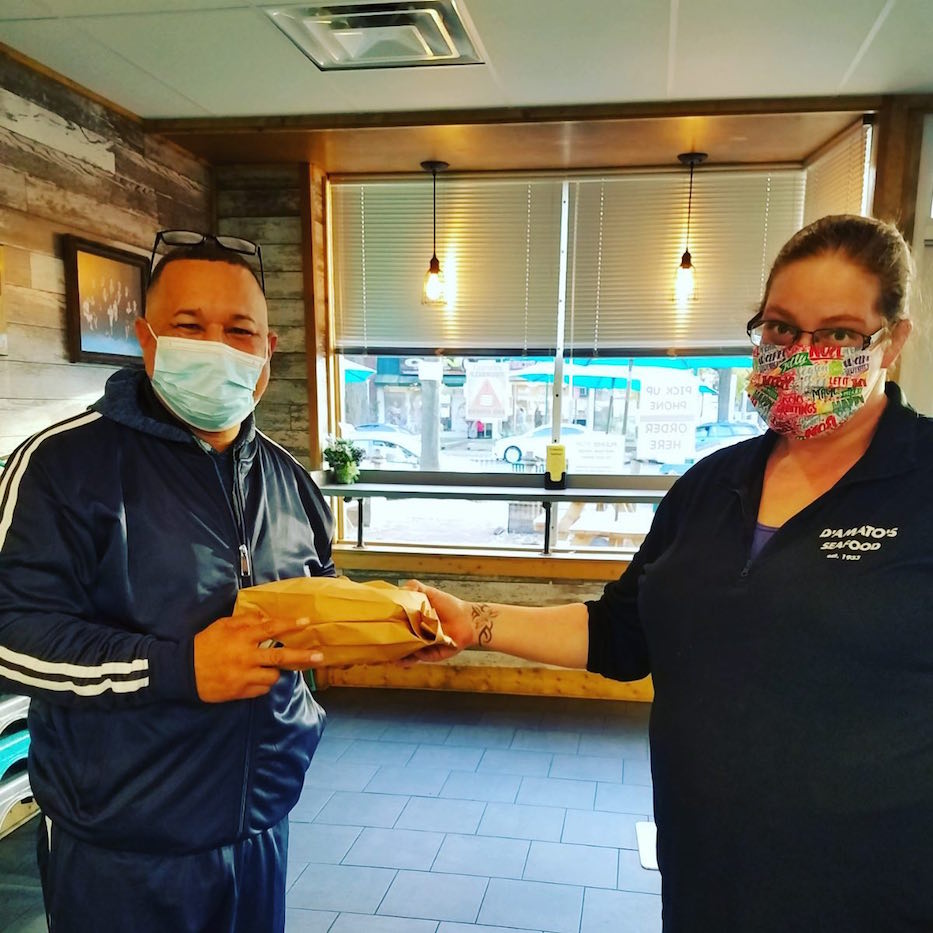
D'Amatos Seafood, located on Whalley Ave., has been running a number of challenges on social media to promote ordering. During their current "November Everyday Giveaway," New Havener G’Tyme Kimbro who won fried fish sandwich and a slice of carrot cake. Facebook Photo.
“We did really, really well when everything was shut down,” she said. “I think if the city can help these restaurants get known for takeout ahead of that [the winter], it would be a great service. If people know you do takeout, they will come. They are willing to come out if they know they’re going to be in and out in five minutes.”
She added that the restaurant is still worrying about the winter. Months after the CARES Act and first round of federal stimulus money, customers aren’t coming in as frequently because they have less money to spend. This month, D’Amatos started a “November Everyday Giveaway,” where placing an order during the month of November makes customers eligible for a free meal. She asked Fontana if the city could be a better partner in spreading the word that places are open for business and very much in need of support.
“It’s going to hell now, because everyone’s running out of money,” she said.
Miguel Pittman, who runs Sandra’s Next Generation on Congress Avenue with his wife Sandra Harris Pittman, said their team has also found success in a takeout-only model. To defray the costs of services like GrubHub and UberEats—which sometimes take over 30 percent of total revenue—he and Harris Pittman have built those charges into the menu and found that customers are willing to pay a little more. He also recommended online point of service (POS) ordering platforms like Toast, which streamline service for both the customer and the restaurant.
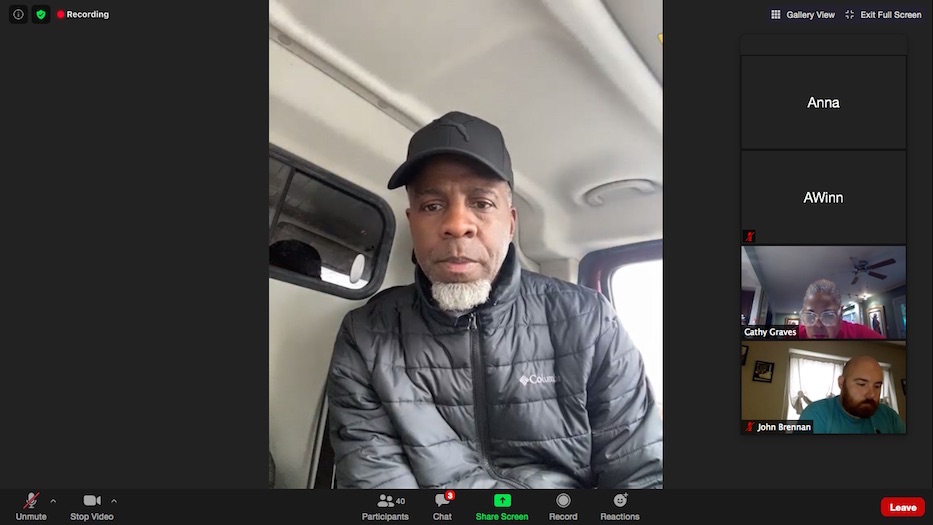
He added that restaurateurs now have one more job: social media management that shows off both the food and the people making it. When she isn’t whipping up steaming plates of soul food or engineering socially distanced plans for Thanksgiving, Harris Pittman is on social media, working on photo and video content for Facebook and Instagram.
Pete Maniatis, who owns Zoi’s on Grove Street, suggested that the city could also be doing more to amplify the breadth of independent food businesses in the city. Like D’Amato, he asked Fontana to do a better job of letting New Haveners—and people across the state—know who is open for business. He also urged his fellow restaurateurs to do the same.
“I was always telling them [customers] that I was going to be here, no matter what,” he recalled of the beginning of the pandemic. “I’m looking at this screen, and I’m seeing a lot of great business owners and diversity. It might be a great idea as a marketing campaign to say, here, come visit us and say ‘no matter what, New Haven is going to be open.’ Come visit this winter wonderland.”
“Don’t go to the Chili’s,” he continued. “Don’t go to the Friday’s. You can go spend almost exactly the same amount at any of these [independent] establishments. Everybody loves the energy of New Haven. I think we need to promote us. We promote us being open. We promote us being here for you.”
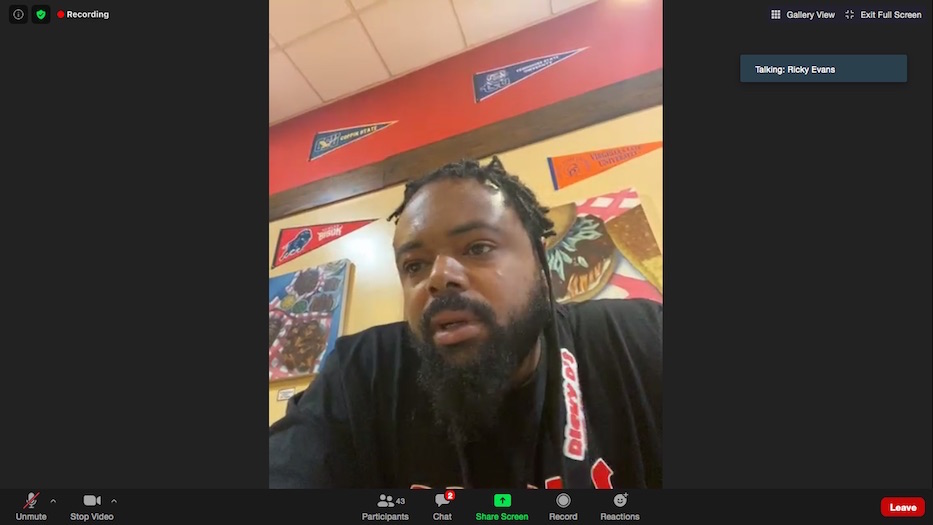
Ricky Evans, who owns Ricky D's Rib Shack in the Science Park area, said business has been slow. He called takeout the most reliable option.
Fontana explained that the city has been looking at multiple models, from seeking caps on third-party delivery services to following something like Charleston’s “Adopt A Restaurant” program. The former has already taken effect in larger cities including New York and San Francisco. Nebyat Shewaye, who owns B Natural Cafe and B Natural Kitchen with his wife Gabi Merayo, said that a cap is long overdue: restaurants like his can’t afford delivery services. Because his establishments are downtown, customers who don’t live nearby aren’t likely to make the trip out to buy his food.
The latter would urge New Haven and Connecticut residents to “adopt” an area restaurant by pledging to order takeout from the same establishment once a week. In Charleston, it is run by the not-for-profit Lowcountry Local First. In New Haven, Fontana suggested it would be an initiative to the city similar to its Together New Haven campaign that launched in late March. Some restaurants have already transitioned to a similar model, in which they offer weekly, pre-made meal subscriptions.
“There are resources out there,” Fontana said. “We are trying to think through how we can be helpful.”
Anna Antonakis, who runs The Greek Olive on Sargent Drive with her husband Tony, urged Fontana to work faster. Because the restaurant is in an area dominated by industrial businesses and office buildings that are now empty, the couple has seen foot traffic disappear. Reliable customers, such as staff and cast members from nearby Long Wharf Theatre, aren’t around anymore. Many of them may not be coming back for some time.
“The businesses have disappeared,” she said, noting that the nearby hotel is empty. “No one is back in their offices. We don’t really have residents around us. I’ve been in the city of New Haven for 40 years doing business, and this is the first time I don’t know what to do. I noticed the shoreline has really pushed ‘buy local.’ And New Haven needs to push ‘buy local.’ We have customers, but we don’t have enough to get us through this hump.”
“We’re Not Out Of The Forest Yet”
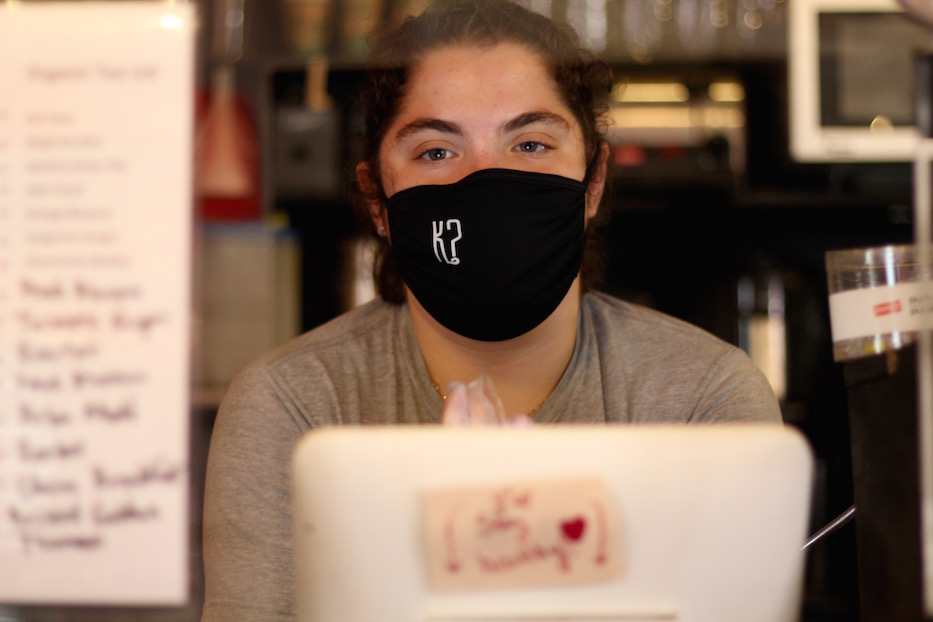
Beckett Morris, a barista at Koffee? on Audubon Street. Lucy Gellman Photos. The photo of Duncan Goodall is Koffee's photo, with Goodall's permission.
Many of the businesses that have struggled relied heavily on Yale (food businesses in Westville, by comparison, are doing surprisingly well) before the pandemic. On Audubon Street, Koffee? is still standing. Owner Duncan Goodall and Koffee Katering supervisor Andrea Ascah-Robinson want to make sure it makes it through the winter.
Prior to March, Koffee?’s catering services made up three quarters of its revenue. The bulk of that came from Yale University. When the university sent students home and asked staff to work remotely in March, catering services screeched to a halt.
Goodall, who was dealing with statewide shutdowns and an alphabet soup of COVID-19 relief funding, made the digital pivot. Meanwhile, he was forced to lay off staff members, only some of whom received the unemployment that they applied for. Most have since returned.
“We have been through several different iterations,” he said in a recent phone call. “Where to even start? It's definitely been a challenge. I am both frightful and grateful. We're still losing money. We're not out of the forest yet.”

Almost immediately, he changed the cafe’s website and started playing with different takeout models. In early April, Koffee? announced that it would be offering "Koffee? Kare” packages featuring the space’s sweet and savory treats for pickup and delivery. Where Koffee? Katering had offered shareable platters before the pandemic, it switched contactless catering with individually packaged items. Then he waited.
“What I discovered is that no one wanted it, because the state of Connecticut is not allowing congregations of people to come together,” he said in a recent phone interview. “Yale is at like 10 [people]. I don't anticipate anything like that coming back for the next year, at a minimum. People are terrified.”
In early May, the cafe reopened with a new take-out model at its front window, with terrasse seating in front and socially distanced tables set up in the back. Goodall continued to experiment, with pick-up cocktail kits that mirrored those Ordinary New Haven was doing downtown. In September, the cafe reopened indoor seating with new plexiglass barriers and furniture removed.
In an interview just before Halloween, Ascah-Robinson noted that COVID-19 has changed the economic footprint of the neighborhood. Nearby, The Hive Hair Studio owner Jenna Vollano has decided not to renew the lease for her Whitney Avenue location. The Foundry Music Company, tucked away next door, has announced that it will be closing its brick-and-mortar location and moving entirely online.
Parents from Neighborhood Music School, of the cafe’s most reliable streams of income, don’t come by now because their kids’ classes are largely online. While staff members have thought about bringing back pre-pandemic events like live music and vinyl nights, they also know it’s not safe to do so when cases are spiking in the state.
“We used to have a pretty predictable rhythm, and now it’s a total roll of the dice,” Ascah-Robinson said as the soundtrack to the Rocky Horror Picture Show played softly in the cafe. “From a business perspective, that can be challenging. I think that the next month will be pretty crucial in terms of making decisions.”
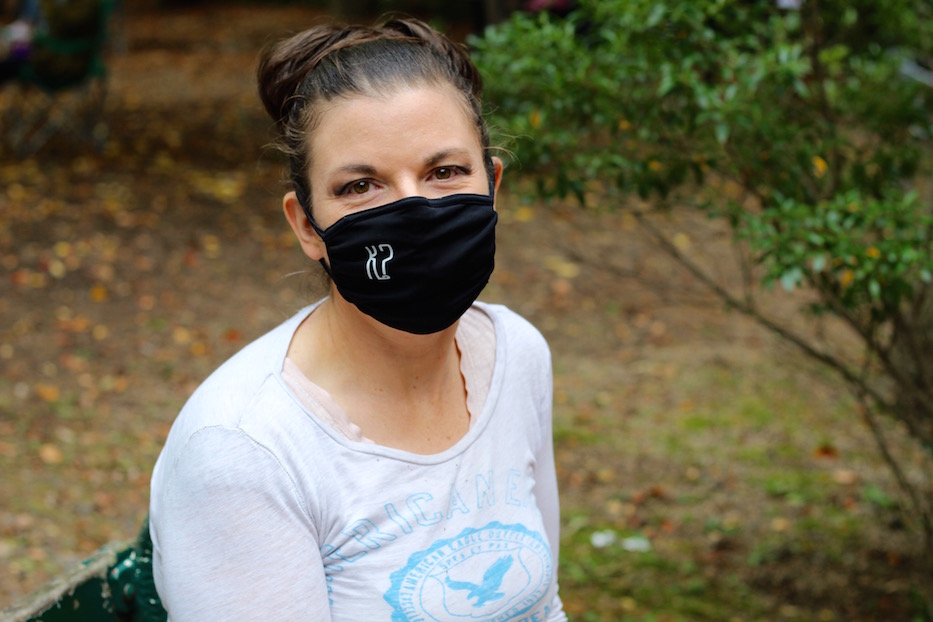
Andrea Ascah-Robinson. Lucy Gellman Photo.
Inside, chairs and tables have been rearranged, with spray bottles of disinfectant dotting the space. Plexiglass dividers separate staff from customers and customers from each other. Stickers show people where to stand in line; doors and windows stay open to increase air flow. On a recent Wednesday, friends chatted and sipped coffee on a big couch near the entrance. Ascah-Robinson said that kind of connection has remained important to Koffee? staff as they try to navigate a future where gathering looks and feels different.
“We just want to keep our doors open and make sure that we get through this,” she said. “We need the businesses that are here. This whole process has been so isolating. We’ve been happy to get to a place where people can connect. It feels good after so many months.”
But staying open isn’t assured, she said. Goodall estimated that the cafe is operating at a quarter of what it was before the pandemic. He called for more help from the city, from city-sponsored heaters to more visibility from the Economic Development Administration. In the spring, he signed onto a petition asking the city to partially close Audubon Street to traffic, just as it has with sections of College and Orange Streets.
“All of the small businesses are going through this right now,” he said. “We are up to our eyeballs just trying to figure out this new environment. Do I do this? Do I do that? I'm innovating all the time, so I literally don't have time to work with the city. I need someone from the city who is going to look at this. This is something that everyone in New Haven is trying to figure out.”
“You go onto Amazon and you search for heaters, gone,” he added. “Totally gone. You look for HEPA filters with UV, and they're gone. As a generalized mentality of small business, our approach has always been: I will pay my taxes, I will pay my permit fees, and my only ask is that you stay out of my way. We need the state. We need the city. We can't do this alone.”
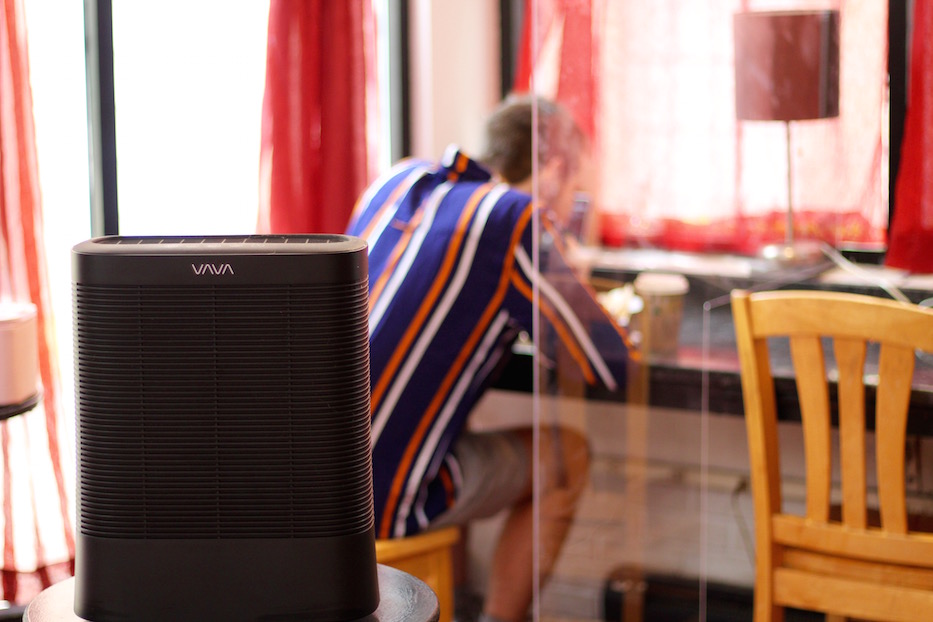
Donna Curran, who runs Zinc downtown, is equally worried about the winter. When COVID-19 shuttered businesses in New Haven in March, she was already sick with what she now believes was the virus after returning from Australia in early March. In a move that may have saved staff, she didn’t go into work for two weeks.
After Gov. Ned Lamont’s executive order to close nonessential businesses, she gathered the restaurant’s 25-person staff, issued layoffs, and told them to apply for unemployment immediately. Three salaried staff members stayed on to close and clean the restaurant and pack up excess food (“It's harder to close a restaurant than to open it, I think,” she said in a recent phone call). Then “we hunkered down” with a skeleton crew and tried to figure out a new model.
In May, Zinc worked with Frontline Foods to serve over 1,000 meals to healthcare workers. Around the same time, it was offering online cooking classes and prepackaged meal kits. Curran reopened the patio to New Haveners on August 8. With heat lamps and new city regulations, it may stay open well into the fall and winter. The restaurant has also reopened its indoor space, but Curran has heard from patrons that they’re hesitant to eat indoors given the risk.
She has been able to bring 11 employees back, but estimated Zinc is only making a third of the revenue it was bringing in before the pandemic. While the restaurant was a recipient of round two Paycheck Protection Program (PPP) funding, which is going to rent and payroll, Curran said that money will only sustain the restaurant through the end of this month. Meanwhile the costs of doing business during COVID-19 add up quickly—a new point of sale system and plexiglass social dividers alone were recently over $8,000.
She said that she’d like to see more visibility from both the city and from Yale. With Yale students, faculty and staff working mostly remotely, there are no private parties or conference dinners, and less foot traffic downtown than normal. Beyond its annual $13 million contribution to the city, the university has not offered sustained financial support to downtown businesses during the pandemic.
“It's disappointing that they don't take the greater good into consideration,” she said. “They could wake up a year from now and realize they’re a much less vibrant town because of it.”
Meanwhile, she said that neither city staff nor members of the Town Green Special Services District have stopped by to ask what they can do. She recalled that for Mayor John DeStefano, that kind of visit wasn’t an uncommon occurrence. She said she would like to see members of Mayor Justin Elicker’s administration—or perhaps Elicker himself—asking how the city can help.
“It’s been a struggle all around,” she said. “Economic Development did a little bit of outreach, but I would have expected a little bit more of a presence from them.”

